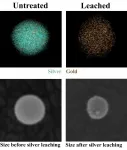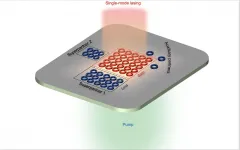INFORMATION:
Note to Editors:
For further information, or requests for interview with Prof. Hill, please contact: news.office@admin.ox.ac.uk
About R21/Matrix-M:
R21 was produced by expressing recombinant Hepatitis B surface antigen (HBsAg) virus-like particles in Hansenula polymorpha, comprising the central repeat and the C-terminus of the Plasmodium falciparum circumsporozoite protein (CSP), fused to the N-terminal end of HBsAg. It is manufactured by the Serum Institute of India Private Ltd (SIIPL). R21 was mixed prior to administration with Matrix-M, a saponin-based vaccine adjuvant produced by Novavax AB, Uppsala, Sweden.
Development of R21/Matrix-M, a vaccine which targets P. falciparum malaria, has been accelerated by a collaboration between the Jenner Institute at Oxford University, the Serum Institute of India Pvt Ltd and Novavax Inc. working with many clinical trial units in the UK and Africa.
About Malaria:
The World Health Organisation (WHO) estimates that malaria causes over 400,000 deaths each year globally and progress in reducing malaria mortality has stalled in recent years. Most deaths are amongst children in Africa where very high transmission rates are found in many countries.
229 million cases of clinical malaria were reported in 2019.
Over 100 malaria vaccine candidates have entered clinical trials over recent decades but none has shown the >75% efficacy targeted by World Health Organization's Malaria Vaccine Technology Roadmap.
About the Jenner Institute:
The Jenner Institute is based within the Nuffield Department of Medicine, University of Oxford, and operates out of the Old Road Campus Research Building, in Headington, Oxford. The Jenner Institute also supports senior vaccine scientists, known as Jenner Investigators, within many other departments across the University of Oxford, as well as externally within The Pirbright Institute and the Animal and Plant Health Agency.
The Jenner Institute brings together investigators who are designing and developing numerous vaccines to generate an exceptional breadth of scientific know-how and critical mass, whilst still allowing the individual investigators to remain independent and accountable to their funders and stakeholders.
The Jenner Institute is supported by the Jenner Vaccine Foundation, a UK registered charity and is advised by the Jenner Institute Scientific Advisory Board.
About the University of Oxford
Oxford University has been placed number 1 in the Times Higher Education World University Rankings for the fifth year running, and at the heart of this success is our ground-breaking research and innovation.
Oxford is world-famous for research excellence and home to some of the most talented people from across the globe. Our work helps the lives of millions, solving real-world problems through a huge network of partnerships and collaborations. The breadth and interdisciplinary nature of our research sparks imaginative and inventive insights and solutions.
Through its research commercialisation arm, Oxford University Innovation, Oxford is the highest university patent filer in the UK and is ranked first in the UK for university spinouts, having created more than 200 new companies since 1988. Over a third of these companies have been created in the past three years.
Malaria vaccine becomes first to achieve WHO-specified 75% efficacy goal
Researchers from the University of Oxford and their partners have today reported findings from a Phase IIb trial of a candidate malaria vaccine, R21/Matrix-M, which demonstrated high-level efficacy of 77% over 12-months of follow-up.
2021-04-23
(Press-News.org) Researchers from the University of Oxford and their partners have today reported findings from a Phase IIb trial of a candidate malaria vaccine, R21/Matrix-M, which demonstrated high-level efficacy of 77% over 12-months of follow-up. In their findings (posted on SSRN/Preprints with The Lancet) they note that they are the first to meet the World Health Organization's Malaria Vaccine Technology Roadmap goal of a vaccine with at least 75% efficacy.
The authors report (in findings in press with The Lancet) from a Phase IIb randomised, controlled, double-blind trial conducted at the Clinical Research Unit of Nanoro (CRUN) / Institut de Recherche en Sciences de la Santé (IRSS), Burkina Faso. 450 participants, aged 5-17 months, were recruited from the catchment area of Nanoro, covering 24 villages and an approximate population of 65,000 people.
The participants were split into three groups, with the first two groups receiving the R21/Matrix-M (with either a low dose or high dose of the Matrix-M adjuvant) and the third, a rabies vaccine as the control group. Doses were administered from early May 2019 to early August 2019, largely prior to the peak malaria season.
The researchers report a vaccine efficacy of 77% in the higher-dose adjuvant group, and 71% in the lower dose adjuvant group, over 12 months of follow-up, with no serious adverse events related to the vaccine noted.
Following these results, the Phase IIb trial, which was funded by the EDCTP2 programme supported by the European Union (grant number RIA2016V-1649-MMVC), was extended with a booster vaccination administered prior to the next malaria season one year later.
The researchers, in collaboration with Serum Institute of India Private Ltd., and Novavax Inc., have now started recruitment for a Phase III licensure trial to assess large-scale safety and efficacy in 4,800 children, aged 5-36 months, across four African countries.
Halidou Tinto, Professor in Parasitology, Regional Director of IRSS in Nanoro, and the trial Principal Investigator said:
'These are very exciting results showing unprecedented efficacy levels from a vaccine that has been well tolerated in our trial programme. We look forward to the upcoming phase III trial to demonstrate large-scale safety and efficacy data for a vaccine that is greatly needed in this region.'
Adrian Hill, Director of the Jenner Institute and Lakshmi Mittal and Family Professor of Vaccinology at the University of Oxford, and co-author of the paper, said:
'These new results support our high expectations for the potential of this vaccine, which we believe is the first to reach the WHO's goal of a vaccine for malaria with at least 75% efficacy.
'With the commitment by our commercial partner, the Serum Institute of India, to manufacture at least 200 million doses annually in the coming years, the vaccine has the potential to have major public health impact if licensure is achieved.'
Professor Charlemagne Ouédraogo, Minister of Health, in Burkina Faso said:
'Malaria is one of the leading causes of childhood mortality in Africa. We have been supporting trials of a range of new vaccine candidates in Burkina Faso and these new data show that licensure of a very useful new malaria vaccine could well happen in the coming years. That would be an extremely important new tool for controlling malaria and saving many lives.'
Professor Alkassoum Maiga Ministry of Higher Education, Scientific Research and Innovation in Burkina Faso, said:
'I am proud of Burkina Faso researchers who made a great contribution to reach this important milestone. Hope that the upcoming phase III trial will confirm these exciting findings and that this vaccine could have a real impact on this disease affecting millions of children every year.'
Dr Cyrus Poonawalla and Mr Adar Poonawalla, Chairman and CEO of the Serum Institute of India said:
'We are highly excited to see these results on a safe and highly effective malaria vaccine which will be available to the whole world through an excellent collaborative effort between Serum Institute, the University of Oxford and Novavax Inc.. Serum Institute is committed to global disease burden reduction and disease elimination strategies by providing high volume, affordable vaccines. We are highly confident that we will be able to deliver more than 200 million doses annually in line with the above strategy as soon as regulatory approvals are available.'
Dr Michael Makanga, EDCTP Executive Director, said:
'We congratulate the Multi-stage Malaria Vaccine Consortium on these highly promising results from the Burkina Faso trial of R21. This study represents a key advance in the clinical development of the R21 malaria vaccine towards licensure, and an important step closer to malaria control and elimination.'
Gareth Jenkins, Director of Advocacy, Malaria No More UK, said:
'An effective and safe malaria vaccine would be a hugely significant extra weapon in the armoury needed to defeat malaria, which still kills over 270,000 children every year. For decades, British scientists have been at the forefront of developing new ways to detect, diagnose, test and treat malaria, and we must continue to back them.
'A world without malaria is a world safer both for the children who would otherwise be killed by this disease, and for us here at home. Countries freed from the malaria burden will be much better equipped to fight off new disease threats when they inevitably emerge in the future.'
ELSE PRESS RELEASES FROM THIS DATE:
Radar satellites can better protect against bushfires and floods
2021-04-23
New research led by Curtin University has revealed how radar satellites can improve the ability to detect, monitor, prepare for and withstand natural disasters in Australia including bushfires, floods and earthquakes.
The research used Synthetic Aperture Radar data obtained by the European Space Agency Sentinel-1 satellite, amongst others, to evaluate Australia-specific case studies.
Lead researcher Dr Amy Parker, an ARC Research Fellow from Curtin's School of Earth and Planetary Sciences, said the Sentinel-1 satellite mission provided the first complete global Synthetic Aperture Radar (SAR) dataset and the first opportunity to use this type of data to assess hazards in new locations, including Australia.
"What makes SAR so valuable is that it provides all-weather and night-and-day ...
Using spatial distance strategically with luxury and popular product displays
2021-04-23
Researchers from Nanjing University, National Sun Yat-sen University, and Northwestern University published a new paper in the Journal of Marketing that shows that the spatial distance between products and consumers can affect perceived value and willingness to pay.
The study, forthcoming in the Journal of Marketing, is titled "Values Created from Far and Near: Influence of Spatial Distance on Brand Evaluation" and is authored by Xing-Yu (Marcos) Chu, Chun-Tuan Chang, and Angela Y. Lee.
No one ever questions why some retail products are on display in cabinets behind the sales counter, ...
New species of dumbo octopus identified using minimally invasive techniques
2021-04-23
A new species of deep-sea dwelling dumbo octopus called Grimpoteuthis imperator sp. nov. has been described using a combination of MRI, micro-CT and minimally invasive gene analysis rather than traditional dissection methods. The findings are presented in the open access journal BMC Biology.
The single specimen, which was identified as a mature male, was named G. imperator because it was discovered in the northern part of the Emperor Seamounts, an undersea mountain ridge in the Northwest Pacific Ocean. In addition to the scientific name in Latin, the authors suggest possible common names for this new species such as Emperor dumbo, Dumbo impérial (French), and Kaiserdumbo (German).
Finned or dumbo octopods, although considered rare organisms, form ...
Naturally GM: Crops steal genes from other species to accelerate evolution
2021-04-23
Grass crops are able to bend the rules of evolution by borrowing genes from their neighbours, giving them a competitive advantage, a new study has revealed.
Research, led by the University of Sheffield, is the first to show that grasses can incorporate DNA from other species into their genomes through a process known as lateral gene transfer.
The stolen genetic secrets give them an evolutionary advantage by allowing them to grow faster, bigger or stronger and adapt to new environments quicker. These findings could inform future work to create crops that are more resistant to the effects of climate change and help to tackle food security problems.
The Sheffield team studied grasses, which include some of the most economically and ecologically important plants, such as the most ...
Teaching pupils to 'think like Da Vinci' will help them to take on climate change
2021-04-23
A radically reformed approach to education, in which different subjects teach connected themes, like climate change or food security, is being proposed by researchers, who argue that it would better prepare children for future crises.
In a newly-published study, education researchers from the Universities of Cambridge and Edinburgh argue that there is a compelling case for a drastic shake-up of the school curriculum, so that subjects are no longer taught independently of one another. Instead, they argue that the arts and sciences should 'teach together' around real-world problems, and in a manner ...
Finding new life for wine-grape residue
2021-04-23
California produces nearly 4 million tons of world-class wine each year, but with that comes thousands of tons of residue like grape skins, seeds, stems and pulp. What if scientists could harness that viticultural waste to help promote human health?
Maybe they can, according to new research from food scientists at the University of California, Davis. In a study published in the journal LWT - Food Science and Technology, the team discovered a wealth of potentially health-enhancing compounds and sugar molecules called oligosaccharides within chardonnay wine-grape pomace.
Oligosaccharides are found in many plant and animal tissues, including human breast milk. Recent advances have revealed oligosaccharides' vast potential ...
Silver ions hurry up, then wait as they disperse
2021-04-22
HOUSTON - (April 22, 2021) - There's gold in them thar nanoparticles, and there used to be a lot of silver, too. But much of the silver has leached away, and researchers want to know how.
Gold-silver alloys are useful catalysts that degrade environmental pollutants, facilitate the production of plastics and chemicals and kill bacteria on surfaces, among other applications. In nanoparticle form, these alloys could be useful as optical sensors or to catalyze hydrogen evolution reactions.
But there's an issue: Silver doesn't always stay put.
A new study by scientists at Rice University and the University ...
Army-funded research paves way for improved lasers, communications
2021-04-22
RESEARCH TRIANGLE PARK, N.C. -- New photonics research paves the way for improved lasers, high-speed computing and optical communications for the Army.
Photonics has the potential to transform all manners of electronic devices by storing and transmitting information in the form of light, rather than electricity. Using light's speed and the way information can be layered in its various physical properties can increase the speed of communication while reducing wasted energy; however, light sources such as lasers need to be smaller, stronger and more stable to achieve that, researchers ...
What Parkinson's disease patients reveal about how art is experienced and valued
2021-04-22
PHILADELPHIA-- Art appreciation is considered essential to human experience. While taste in art varies depending on the individual, cognitive neuroscience can provide clues about how viewing art affects our neural systems, and evaluate how these systems inform our valuation of art. For instance, one study shows that viewing art activates motor areas, both in clear representations of movement, like Adam and Eve in Michelangelo's Expulsion from Paradise, and in implied movement through brush strokes, like in Franz Kline's gestural paintings.
Altered neural functioning, like that experienced in patients with Parkinson's disease, changes the way ...
Law professor argues for removing police from traffic enforcement
2021-04-22
University of Arkansas law professor Jordan Blair Woods challenges the conventional wisdom that only police can enforce traffic laws.
In "Traffic Without Police," to be published in Stanford Law Review, Woods articulates a new legal framework for traffic enforcement, one that separates it from critical police functions, such as preventing and deterring crime, conducting criminal investigations and responding to emergencies.
If not the police, who then would enforce traffic laws? As Woods explains, jurisdictions would delegate most traffic enforcement to newly created traffic agencies. These public offices would operate independently from ...
LAST 30 PRESS RELEASES:
ASU researchers to lead AAAS panel on water insecurity in the United States
ASU professor Anne Stone to present at AAAS Conference in Phoenix on ancient origins of modern disease
Proposals for exploring viruses and skin as the next experimental quantum frontiers share US$30,000 science award
ASU researchers showcase scalable tech solutions for older adults living alone with cognitive decline at AAAS 2026
Scientists identify smooth regional trends in fruit fly survival strategies
Antipathy toward snakes? Your parents likely talked you into that at an early age
Sylvester Cancer Tip Sheet for Feb. 2026
Online exposure to medical misinformation concentrated among older adults
Telehealth improves access to genetic services for adult survivors of childhood cancers
Outdated mortality benchmarks risk missing early signs of famine and delay recognizing mass starvation
Newly discovered bacterium converts carbon dioxide into chemicals using electricity
Flipping and reversing mini-proteins could improve disease treatment
Scientists reveal major hidden source of atmospheric nitrogen pollution in fragile lake basin
Biochar emerges as a powerful tool for soil carbon neutrality and climate mitigation
Tiny cell messengers show big promise for safer protein and gene delivery
AMS releases statement regarding the decision to rescind EPA’s 2009 Endangerment Finding
Parents’ alcohol and drug use influences their children’s consumption, research shows
Modular assembly of chiral nitrogen-bridged rings achieved by palladium-catalyzed diastereoselective and enantioselective cascade cyclization reactions
Promoting civic engagement
AMS Science Preview: Hurricane slowdown, school snow days
Deforestation in the Amazon raises the surface temperature by 3 °C during the dry season
Model more accurately maps the impact of frost on corn crops
How did humans develop sharp vision? Lab-grown retinas show likely answer
Sour grapes? Taste, experience of sour foods depends on individual consumer
At AAAS, professor Krystal Tsosie argues the future of science must be Indigenous-led
From the lab to the living room: Decoding Parkinson’s patients movements in the real world
Research advances in porous materials, as highlighted in the 2025 Nobel Prize in Chemistry
Sally C. Morton, executive vice president of ASU Knowledge Enterprise, presents a bold and practical framework for moving research from discovery to real-world impact
Biochemical parameters in patients with diabetic nephropathy versus individuals with diabetes alone, non-diabetic nephropathy, and healthy controls
Muscular strength and mortality in women ages 63 to 99
[Press-News.org] Malaria vaccine becomes first to achieve WHO-specified 75% efficacy goalResearchers from the University of Oxford and their partners have today reported findings from a Phase IIb trial of a candidate malaria vaccine, R21/Matrix-M, which demonstrated high-level efficacy of 77% over 12-months of follow-up.


